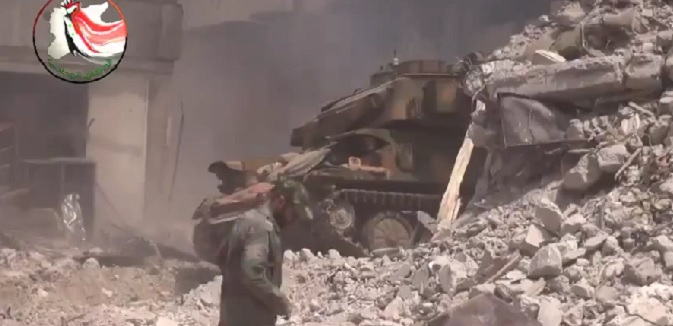The Associated Press on Tuesday described Syrian rebels as “making their last desperate stand in Homs,” as forces loyal to the Bashar al-Assad regime pressed what has been an unsteady march of advances across the war-torn country.
Some among the hundreds of rebels remaining in the city talk of surrender, according to opposition activists there. Others have lashed back against the siege with suicide car bombings in districts under government control. Some fighters are turning on comrades they suspect want to desert, pushing them into battle.
“We expect Homs to fall,” said an activist who uses the name Thaer Khalidiya in an online interview with The Associated Press. “In the next few days, it could be under the regime’s control.”
Homs, which is Syria’s third largest city, has been a strategically critical hotspot for much of the country’s roughly three-year-long conflict. It links Damascus with Aleppo, the country’s largest population center, and a city that itself saw dozens killed this week by Syrian airstrikes. The attacks reportedly deployed mass casualty barrel bombs, helicopter-deployed shrapnel-packed IEDs that have been condemned as “barbaric” by Secretary of State John Kerry and as a “war crime” by British Foreign Secretary William Hague.
“The use of this deliberately indiscriminate weapon is yet another war crime, and is clearly designed to sow terror and weaken the will of the civilian population,” Foreign Secretary William Hague told Britain’s parliament.
Meanwhile Mohammad al-Lahham, the president of the Syrian parliament, announced Monday that the country’s presidential elections would be held on June 3, promising that the process would be “free and fair.” Al Arabiya opened its coverage of the statement by noting that “[t]he United Nations harshly criticized” the decision, conveying comments from both U.N. Secretary-General Ban Ki-moon and U.N. Special Envoy to Syria Lakhdar Brahimi to that effect.
Ban and Brahimi believe holding a presidential election “will damage the political process and hamper the prospect for a political solution that the country so urgently needs,” [U.N. spokesman] Dujarric said.
“Such elections are incompatible with the letter and spirit of the Geneva communique,” he added, referring to an agreement between the government and the opposition on the transition to democracy as a basis for the negotiations between the opposing parties.
Opposition elements for their part denounced the election as a “farce.” A range of observers, including Brahimi himself, expressed concerns that spectacles aimed at consolidating the legitimacy of the Assad regime would undermine negotiations aimed at ending the conflict. Talks held earlier this year, which took place alongside reports of new atrocities being committed by Syrian forces, ended in deadlock.
[Photo: Prenom NomBis / YouTube]




